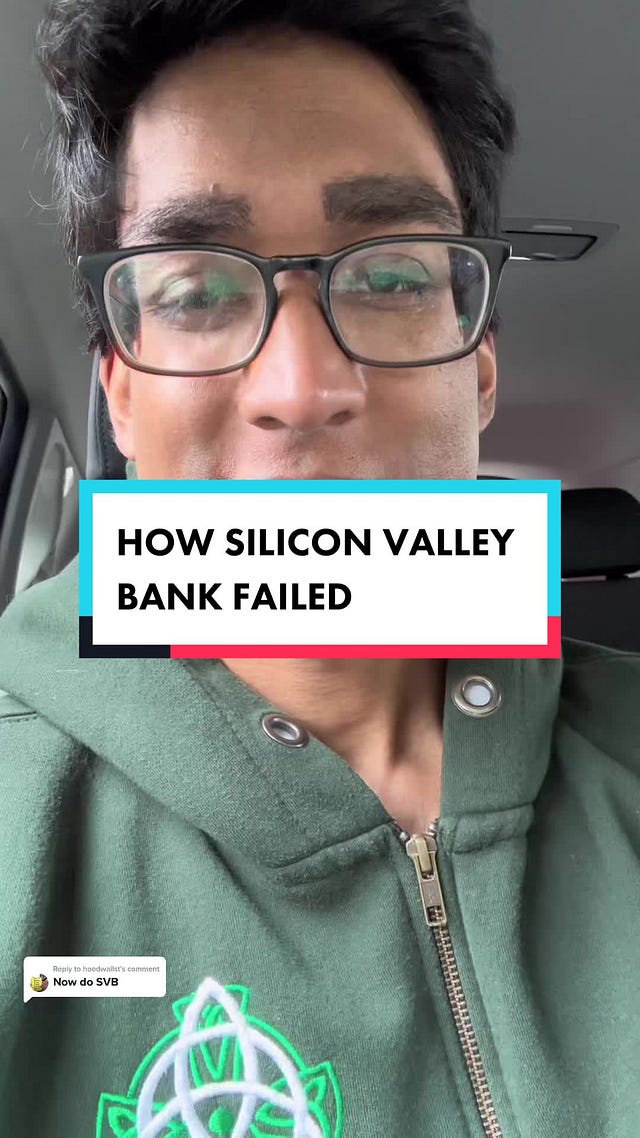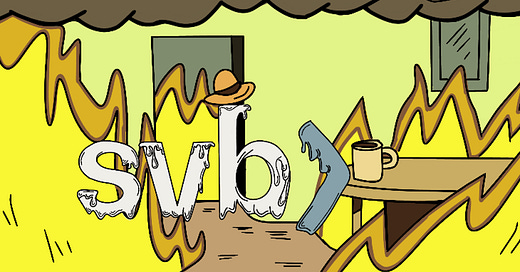Hello reader,
Welcome to the 20th edition of Access. I’d like to extend an especially warm welcome to our new subscribers - and there are quite a few more of you than usual - it’s great to have you here. If you’re reading this as an email, you can hit reply to drop us a few lines about you and what you’re most interested in reading about, or any questions you have about private markets.
Over the past few days, you might have noticed one topic dominating the financial news:
“Startup-focused lender SVB Financial Group last week became the largest bank to fail since the 2008 financial crisis, sending shockwaves through the global financial system and prompting regulators to step in to contain the fallout.” - Reuters
We’ve been hearing from some of the folk impacted by this, as well as doing a lot of our own reading, so we thought we’d focus this week’s newsletter on what we’ve learned so far. It’s clearly an evolving situation, but we hope this is a useful overview of what’s happened, from the perspectives of some of the people closest to the crisis.
Until next time -
Liz & Melissa
In case you missed it…
Last week’s edition included news & views from across private markets, including:
FEATURING:
In Brief: Insights from the world of private markets
SVB Employees: Open to work?
People news, moves and promotions
SVB on Tiktok: A tragedy in four acts
In Depth: SVB Meltdown
IN BRIEF
SVB Employees: Open to Work?
Our In Depth piece this week goes into more detail on the ins and outs of the SVB collapse, but what of the ~8,500 employees at SVB?
The official line (for now) on the UK arm is that all staff currently employed will remain so, although that could change as the situation develops. Over in the US, initial reports suggested that staff would keep their jobs for 45-days on 1.5 pay; since then, SVB’s new CEO Tim Mayopoulos appears to have reversed this, writing to employees to explain the intention was to operate SVB “for the foreseeable future”, with all staff on continuous employment at normal pay.
That said, many are still understandably worried for their future. There are also emerging stories of layoffs earlier in the year, although this was apparently concentrated on talent acquisition roles, a theme seen elsewhere in the tech and banking world as companies slowed down their hiring.
“Everyone I've met from Silicon Valley Bank has not only been smart but very likeable. That combined with [their] industry expertise… means many will be getting snapped up.”
- Pete Healey, CEO, eFinancial Careers
eFinancial Careers described SVB employees as “well-loved across the financial and technology space”, citing some of the high profile alumni who’ve gone on to prestigious roles across the FS industry. The piece also highlights some of the traits of SVB employees, including deep knowledge and connections within the VC & startup world, which make them highly rated for prospective new employers.
***
People Moves & Promotions Across Our Private Markets Network
Congratulations to Hossein Ghodse, who was appointed Chief Technology Officer at Montagu. Previously IT Director at ICG, Ghodse completed a two year stint as CTO at Ardevora Asset Management before joining Montagu this month.
Also making moves this week… Vera Stenborg starts a new role as People Digital Specialist at EQT Group… Apax Partners appoints Olaf Wentrup as Head of Investor Relations… Luke Denoual joins BC Partners as Fund Controller… and Hg hires Abbie Wickens as Portfolio Reporting Analyst.
***
“How Could a Bank Be Worth 16bn Dollars One Day, Then Close To Zero 2 Days Later?”
If you’re asking yourself the same question, you could do worse than watch this TikTok from sumitsinvestmenttakes, describing SVB’s collapse as a tragedy with four acts.
Thanks to my GenZ colleague for sharing this on Monday morning!

 Tiktok failed to load.
Tiktok failed to load.Enable 3rd party cookies or use another browser
Looking For Your Next Move?
Here’s our pick of private markets job opportunities for March 2023:
European private capital firm looking to hire a senior Cyber Security professional to lead the development of their security strategy
Leading provider of audit, tax & advisory services seeking an experienced accountant to join their Central London practice
Private Equity fund specialising in N. European investments is currently interviewing for a tech / data manager to work in their middle office team
Private markets consultancy working with clients across Europe and US is seeking experienced management consultants to join their growing team
If you're thinking about your next role and would like to talk through your options, please feel free to reach out; we're happy to chat so we know what to keep an eye out for.
IN DEPTH
“Mentally it was really challenging because of stress and lack of sleep — it’s our life’s work. I spent an unhealthy amount of time on Twitter. I wasn’t the best father or husband this weekend.” - Anonymous, via Sifted
Until last week, you might not have heard of Silicon Valley Bank. For those inside the venture & tech community however, it was a trusted partner to some of the fastest-growing start ups in the world. The rapid demise of SVB left many founders in turmoil over the weekend, wondering when, or indeed if, they would recover the funds that were now locked in the failed bank. News of the deal with HSBC brought relief to many UK businesses on Monday morning, but questions still remain.
According to company lore, Silicon Valley Bank was conceived by Bill Biggerstaff and Robert Medearis during a game of poker. Founded in 1983, SVB takes its name from the global centre of technological innovation in Northern California, and set out to offer credit & banking services to the growing number of tech startups in the area, before expanding globally.
Whilst it had built a reputation for being start up friendly, some of SVB’s clients are household names, including online gaming firm Roblox, media company Buzzfeed, and review business Trustpilot.
Who Banked with SVB, and Why?
It’s been widely reported that SVB’s client base included about half of all venture-backed tech & life sciences businesses in the US. Within the UK, that figure was estimated at somewhere between a third and half of the ‘innovation economy’.
To get a sense of how this played out, it’s worth considering what SVB’s clients had in common.
As venture-backed businesses, they tended to have large sums of money on hand from their funders, and expectations of rapid growth. Unlike ‘bootstrapped’ businesses, costs often outstrip revenue, at least in the early days. And unlike a regular business loan, the VC fund will typically take an active role in advising the company, staying closely connected to their investment.
“SVB knew how to understand a business that wouldn’t make money for three to five years. These are companies that require a very different type of bank.”
- Former SVB executive, via FT
Sifted has some excellent coverage of the SVB crisis and how this has impacted the European tech community. Their editor, Amy Lewin, tweeted this on Monday:

And in the replies:
“It’s so difficult to get a high street bank account as a startup in the UK. My startup has 7 figures funding and I can’t yet get a Barclays or similar bank account. It’s all sitting in new banks.” - Alan Patterson
When things started to go south, rumours of SVB’s struggles spread like wildfire through the tech & VC community. Funds were advising their portfolio companies to take their cash out of SVB, which in turn caused a bank run, with large numbers of customers attempting to withdraw their funds due to insolvency fears.


Not all of these conversations took place privately; there’s been some discussion about the role that social media played in the bank run, with several headlines calling it ‘the first Twitter-fuelled bank run’. (For balance, by Wednesday last week, plenty of media outlets were already reporting on SVB’s woes).
The View from Inside the Crisis
By Friday evening, SVB UK was placed into insolvency proceedings. For those who had been unable to remove their cash, it was a nerve-wracking couple of days.
“The 48 hours over the weekend were terrifying and one of the most difficult things I’ve faced as a founder.”
- Tim Chong, co-founder Yonder, via Sifted
One individual who works with impacted firms spoke to us on the condition of anonymity.
“I feel anxious and so do my clients… They don’t have money to pay for their bills, they'll have to call their investors for additional funds - our clients have no clue what their reactions are going to be.”
She went on to explain that “My team are okay, managing as best as they can. I can feel they are also anxious but they're a good team and we will figure it out. Everything is happening so fast and I'm a little unsettled… but I'm sure it will be ok."
Some companies had barely deposited their money before learning of the crisis. In the thread below, Bitewell founder, Samantha Citro Alexander describes their team’s response to the crisis.

In the UK, deposits are only protected up to £85,000. That might sound like a lot, but when you consider the tweet from Lewin (above) referencing a median monthly cashburn of £100k, it’s barely enough to cover the next few weeks.
For many employees of these companies, without the rescue deal announced on Monday, they’d have been facing the unwelcome prospect of not only losing their jobs, but potentially not being paid.
The fallout wasn’t limited to the firms that banked with SVB; their own employees have also been impacted by the events of the past week.
One Tiktoker - a cancer patient, living in the US - shared her reflections after realising that her husband’s job was at risk, leaving them without health insurance.
“My husband worked / works - it’s very confusing, we know very little information - for Silicon Valley Bank, and so our life just got very complicated.”
- kickinauss, via TikTok
In another video, an SVB employee posted that “s*** is f***ing going down at my work, and I don’t know if I’m gonna have a job come Monday”. Despite the uncertainty, they describe SVB as “an awesome place to work”.
In a similar vein, one of the managing directors, Natalie Fratto, took to Twitter to praise her colleagues.

There have been a few pieces written on SVB’s culture, some praising it and others citing it as a reason the bank got into trouble (“Go woke go broke!” was the Daily Mail’s take). A piece in the WSJ proved particularly divisive, prompting Vanity Fair to publish a reply titled THE WALL STREET JOURNAL GOES FULL WHITE SUPREMACIST, BLAMES SILICON VALLEY BANK COLLAPSE ON “1 BLACK” AND “1 LGBTQ+”.

A press release from SVB’s archives talks about their 20-year anniversary celebrations held in 2003.
“To celebrate the company's anniversary, Silicon Valley Bank is hosting client appreciation parties in every major tech center of the country through its eight regions. The largest event occurred in the California Bay Area on October 7, where 1,000 clients, partners, employees, board members and SVB alumni toasted the growth and commitment Silicon Valley Bank has displayed over the last two decades. The company also celebrated "Meg Brook" and "Sue Butler" Days to honor two employees who have remained with the company since 1983.”
On Glassdoor, SVB is rated a respectable 4.1/5 overall with a 92% CEO approval rating (still listed as Greg Becker, who has been exited from SVB and his seat on the Board of San Francisco Federal Reserve Bank.)
Incredibly, there are more than 40 individual reviews from the past week (compared to a total of 14 from February 2023), many of which rate the bank as a 5/5 employer. In the ‘Cons’ section, we saw comments like “None that I can think of!” and “There were no negatives of working there”. This sort of feedback isn’t typical in the aftermath of a company’s collapse.
It’s tempting to wonder if these are manufactured, but I suspect leaders at SVB have better things to do than worry about their Glassdoor rating. Based on what we’ve read elsewhere, it’s entirely possible these reviews reflect employee solidarity - whilst many rate the company highly, CEO approvals are lower than previous reviews, and some of the headlines are telling - “Sad news”, or “Good company but senior leadership took bad risks”.
As one reviewer puts it:
Advice to Management - It's too late now.
And finally… Bridgepoint rebrands, forgets staff? 😉
We’ll leave you with our favourite not-SVB-related LinkedIn post of the week, from fund manager Bridgepoint who announced the launch of their new brand, reflecting their “purpose through the use of connection.”
“It was an exciting day at Bridgepoint yesterday, with the launch of our new identity and website. A year in the making, our new identity is a modern manifestation of who we are today.”
The post was accompanied by a series of photos from their offices showing colour coordinated balloons, cupcakes & party favours, and… absolutely no people to be seen, anywhere.
As one commenter put it:
Nice move…. Seems all the people went away to celebrate 🎉 😉 ?
Thanks for reading. If you don't want to miss our next newsletter, please add Access to your contact list. (Or move this email from "promotions" to your primary inbox.)







